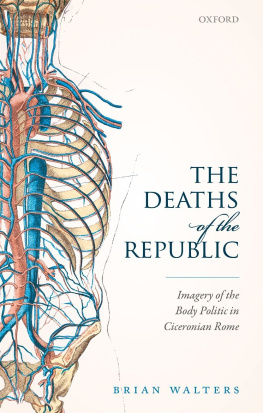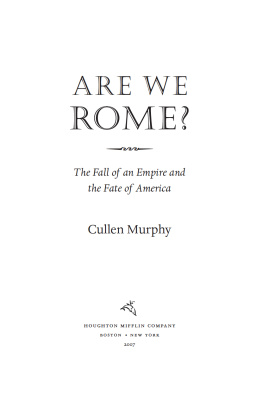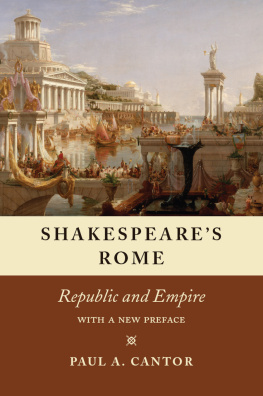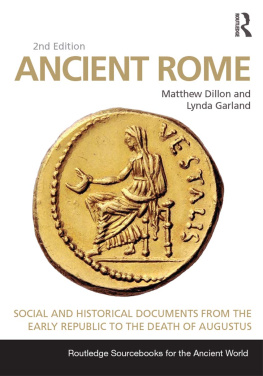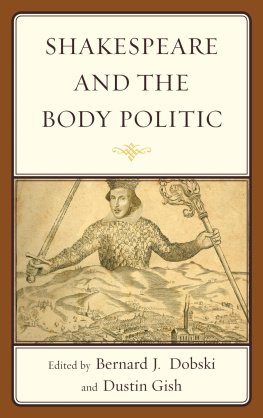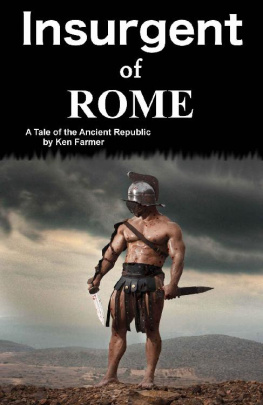Writing is hard in the best of times but almost impossibly so, to paraphrase Lucretius, when ones country seems on the verge of collapse. Our contemporary political climate, and the worry that we too now are in the throes of experiencing our own political bodys disintegrationdi meliora!has made my task more difficult at times than it otherwise might have been. My unhealthy obsession, bordering almost on the pathological, with the plague of hypocrisy and scandal that floods almost daily in recent years from our nations capital, has on more than one occasion threatened to derail my progress entirely. Fortunately, a constant stream of support from advisors, institutions, and friends has always been there to call me back. Among those owed particular gratitude for keeping my humors balanced and helping to ease my anxious mind are: Shane Butler and Tony Corbeill (inspirational advisors, friends, and teachers both, to whom this book is dedicated as a token of lasting thanks), Antony Augoustakis (who has kept me on track and helped more than he likely knows), Kirk Sanders (for lunches, Lil Wayne, and sanity), Angeliki Tzanetou (for support and conversation), Dan Leon (for coffee), Amy Richlin and Bob Gurval (for comments on early drafts of this work when it was still a dissertation), and Michael Brumbaugh, Craig Russell, and Jessica Westerhold (for friendship and advice over the years). Roger Brock and Tom Stevenson shared copies of hard-to-find works and their helpful expertise. Carol Symes gave me productive feedback and kind encouragement at a crucial stage. Colleagues and friends in the department of the Classics at the University of Illinois, Urbana-Champaign have provided a pleasant and receptive environment in which to think and write, while a grant by the University of Illinois Campus Research Board freed me from teaching for a semester, enabling me to carry out much-needed additional research. The suggestions of the anonymous readers from the press have also been very helpful, even where I have failed to follow them. Through it all Julia Hawthorne and Atticus Hawthorne-Walters, my amazing wife and son, have kept me happy, healthy, and entertained.
Aufstieg und Niedergang der rmischen Welt. Geschichte und Kultur Roms im Spiegel der neueren Forschung (Berlin 1972).
A. C. Clark , ed., Q. Asconii Pediani orationum Ciceronis quinque enarratio (Oxford 1907).
Corpus Inscriptionum Latinarum (Berlin 1862).
J. W. Crawford , M. T. Cicero , The Fragmentary Speeches2 (Atlanta 1994).
Diels, H. and W. Kranz , 1952, Die Fragmente der Vorsokratiker6 (Berlin 1952), 3 vols.
T. J. Cornell , ed., The Fragments of the Roman Historians (Oxford 2013), 3 vols.
A. Degrassi , ed., Inscriptiones Latinae Liberae Rei Republicae (Berlin 1965).
H. Dessau , ed., Inscriptiones Latinae Selectae (Berlin 18921916), 3 vols.
Inscriptiones Italiae (Rome 1931).
W. M. Lindsay , ed., Festus, De verborum significatu cum Pauli epitome (Stuttgart and Leipzig 1997).
E. M. Steinby , ed., Lexicon topographicum urbis Romae (Rome 19932000), 6 vols.
T. R. S. Broughton , The Magistrates of the Roman Republic (New York and Atlanta 19511956), 3 vols.
P. G. W. Glare , ed., Oxford Latin Dictionary (Oxford 1982).
H. Malcovati , Oratorum romanorum fragmenta liberae rei publicae4 (Turin 1976).
A. Pitt , M. Terenzio Varrone, de vita populi Romani. Introduzione e comment (Pisa 2015).
J. T. Ramsey , Sallust II. Fragments of the Histories. Letters to Caesar (Cambridge, MA 2015).
A. Pauly , G. Wissowa , and W. Kroll , eds., Realencyclopdie der classischen Altertumswissenschaft (Stuttgart 1893).
M. H. Crawford , Roman Republican Coinage (Cambridge 1974), 2 vols.
D. R. Shackleton Bailey , ed. Ciceros Letters to Atticus (Cambridge 196570), 7 vols. Or Ciceros Epistulae Ad Familiares (Cambridge 1977), 2 vols. Or Ciceros Epistulae Ad Quintum Fratrem et M. Brutum (Cambridge 1980).
T. Stangl , Ciceronis orationum scholiastae (Vienna 1912).
Thesaurus linguae Latinae (Leipzig 1900).
M. Alexander , Trials in the Late Roman Republic 149 bc to 50 bc (Toronto 1990).
E. H. Warmington , Remains of Old Latin III. Lucilius, the Twelve Tables (Cambridge, MA 1938, repr. with corrections 1979).

